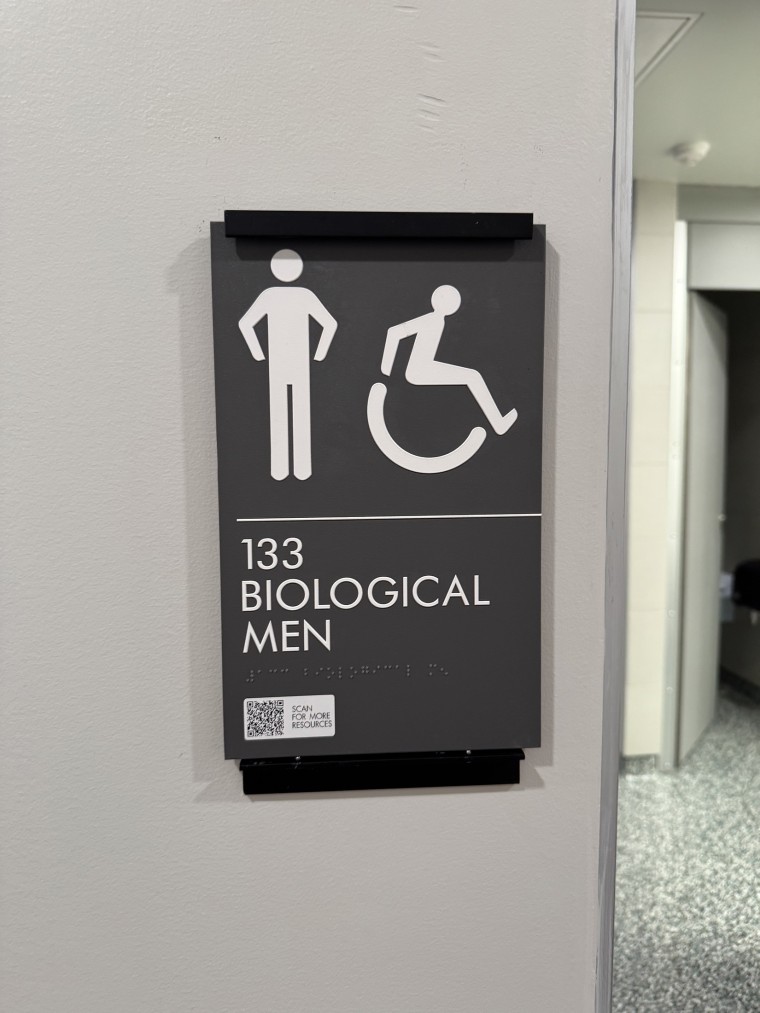Ohio university displays ‘biological’ sex bathroom signs in wake of new state law

One of Ohio’s largest universities has begun displaying signs limiting restroom use to “biological men” and “biological women” following the enactment of a new state law.
The University of Cincinnati began displaying the new signage last week in its residence halls and some other on-campus buildings in response to the passage of a law that restricts bathroom use in public and private K-12 schools and colleges to members of the same “biological sex.” Signed into law by Republican Gov. Mike DeWine in November, the legislation officially goes into effect Tuesday.
A public institution with more than 50,000 students, the University of Cincinnati appears to be the first Ohio college or university to comply with the new law. A representative for TransOhio, a statewide transgender advocacy group, said the school is the first it is aware of that’s “taking any action in response to the bill.” The law does not specify how exactly it should be enforced, making it unclear how other schools will comply.

At least 15 states restrict which restrooms trans people can use in school settings, but only five have laws that apply to colleges and universities. Of these five, only two — Florida and Ohio — have measures that include private colleges and universities, according to the LGBTQ think tank Movement Advancement Project.
A spokesperson for the University of Cincinnati confirmed there have been “signage updates in some residence halls and locker rooms” on campus.
“As a public institution, we are following the law and seeking to meet our mission to create an environment where we provide opportunity, develop educated and engaged citizens and enrich our city, state and world,” the spokesperson, M.B. Reilly, said in an email.
News of the college’s new signage quickly spread after a photo of one of the signs, which reads “biological men,” was shared Thursday on the social media platform Reddit, drawing thousands of comments. Multiple school employees and students who spoke with NBC News said they did not receive any communication from the university about the new signage beforehand.
A QR code linking to a list of single-occupancy restrooms across the campus is attached to the new signs, two students said.
Supporters of the law say it is necessary to ensure the safety and privacy of Ohio students. When the bathroom policy was signed into law in November, its chief sponsor, Republican state Sen. Jerry Cirino, called its passage “common sense” and said the measure “protects our children and grandchildren in private spaces where they are most vulnerable,” according to The Associated Press.
Several transgender students at the University of Cincinnati told NBC News they expect the new bathroom law will make their daily lives more difficult, forcing them to walk longer distances to find restrooms to use.
“I had a panic attack for the first time in a while,” Corvo Hopkins, a 21-year-old junior who is transgender, said in a phone interview. “I haven’t been able to think about anything else.”
Hopkins added that the new bathroom signs send a message to trans students that “we’re not valued, they don’t want us here, and that living on campus, we’re not safe.”
Noah Ciolino, an 18-year-old freshman with irritable bowel syndrome, said he moved 10 floors down in his on-campus dormitory building Saturday, because his former suite didn’t have a single-occupancy bathroom nearby. In order to “legally use the right restroom,” he said that he would have had to ride the elevator to a girls floor or take the stairs. He said he worries about what will happen if his current floor’s only gender-neutral bathroom is occupied during an emergency situation.
“It’s been hard to complete assignments, because I already struggle with depression as it is,” Ciolino said of grappling with the changes on campus. “Have you ever tried to swim in the opposite direction of where the stream is going? It’s like that.”
The new bathroom signs aren’t the only changes the university has seen this month. On Friday, the school’s president, Neville Pinto, sent a letter to students addressing its rollback of diversity, equity and inclusion policies following an executive order by President Donald Trump mandating the elimination of DEI in higher education.
“Given the extent to which our university, like most educational institutions, relies on federal funding to deliver and sustain our core mission, it is untenable to operate as if noncompliance with these directives is an effective option,” Pinto’s letter read. “Our leaders have begun evaluating jobs and duties related to DEI and examining our DEI programming, initiatives and projects to bring all areas into compliance. In addition, we have begun removing references to DEI principles across university websites, social media and collateral materials.”
On Monday, hundreds of students and staffers gathered on campus to protest the DEI rollback, according to NBC affiliate WLWT of Cincinnati.
“I spent three years on this campus helping make a space where students can feel welcome and feel like they can take that mask down and just can be themselves,” Christian Caffey, a student assistant at the school’s LGBTQ Center, told WLWT. “To have Pinto send out the epitome of the end of office day at 3:45 email, then get out the door and hope everybody cools off over the weekend. That email says, ‘Hey, we’re going to scrap all the DEI effort as quickly as possible.’ That felt like a shot of the heart.”




